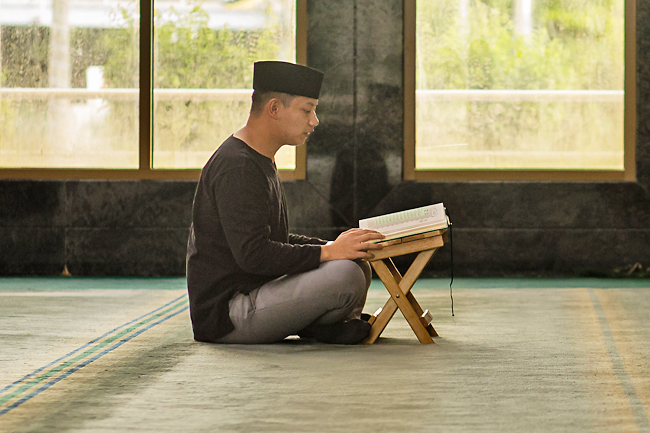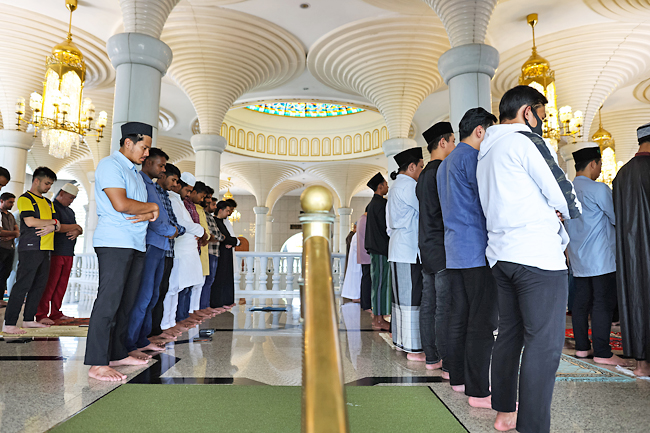When it comes to mental health, Islam has emphasised for centuries: a healthy mind is just as important as a healthy body. In fact, taking care of both is seen as essential in Islam.
But what makes the Islamic approach unique? It’s holistic, integrating physical, emotional, and spiritual well-being, all tied together through practices that have been passed down for over a millennia.
During a special assembly celebrating Maulidur Rasul, Head of Mental Health Strategy at the Health Promotion Centre, Clinical Psychologist Nor Syahmun binti Haji Matassan – offered insights on how the Sunnah, can guide us in preserving our mental health.
1. SOLAT (Prayer)
More than just a religious obligation, solat – when performed with intention – becomes a therapeutic pause that can clear the mind, she explained.
This simple, five-minute act of devotion can be incredibly grounding. In fact, Prophet Muhammad (pbuh) himself turned to prayer in times of hardship.
2. FASTING: STRENGTHENING YOUR WILLPOWER (AND YOUR PATIENCE)
While fasting, especially during Ramadhan, is widely recognised for its physical benefits, it also serves as a powerful mental workout.
Nor Syahmun shared that fasting fosters patience, emotional control, and willpower.
“It’s about more than just abstaining from food and drink; it’s a practice in managing your emotions, particularly anger,” she explained.
From a mental health perspective, fasting can alleviate stress and feelings of guilt, leading to a clearer and more focused mind.
The sense of accomplishment that comes from completing a day of fasting can be incredibly empowering, providing an opportunity to reset both your body and mind.





3. AL-QURAN: YOUR PERSONAL MENTAL HEALTH GUIDE
For immediate mental health benefits, Nor Syahmun said engaging with Al-Quran, “reciting or listening to its verses has a calming effect on the mind, as supported by numerous studies”.
While Al-Quran is often viewed as a spiritual guide, it also serves as a valuable mental health resource. Immersing yourself in its teachings can help shift your focus away from worldly concerns, providing a mental break and moments of reflection.
4. ZIKIR AND DOA: YOUR DAILY DOSE OF CALM
“Remembering Allah the Almighty during both good times and bad helps keep you grounded,” Nor Syahmun said.
Whether you’re silently recite phrases like Subhanallah or offering a personal prayer, zikir and doa serve as anchors for the mind.
When life presents challenges, these acts can provide a sense of comfort, helping to lighten your mental load just a bit.
5. EXERCISE: NATURE’S ANTIDEPRESSANT
While everyone knows that exercise is beneficial for the body, Nor Syahmun highlighted its equally powerful effects on mental health.
“Prophet Muhammad (pbuh) encouraged an active lifestyle, and science supports this – exercise releases endorphins, the feel-good hormones,” she noted.
Even a brisk walk or light stretching can boost your mood, reduce stress, and help keep your mind clear.
Nor Syahmun referred to exercise as “the cheapest antidepressant”, and the best part? You can start anytime, anywhere.
6. MINDFULNESS AND MURAQABAH: BEING PRESENT WITH PURPOSE
In today’s world, “mindfulness” has become a buzzword, but Islam had its own version long before it gained popularity.
Muraqabah, the awareness of Allah the Almighty’s constant presence, is a practice that helps you stay grounded in the moment.
“Muraqabah brings you into a state of calm focus, allowing you to be more in tune with your thoughts and emotions,” explained Nor Syahmun.
It’s about recognising that Allah the Almighty sees and knows everything, providing you with the clarity and peace needed to face life’s challenges with inner calm.
7. CLEANLINESS: MORE THAN JUST HYGIENE
Nor Syahmun reminded the audience that Islam’s emphasis on cleanliness goes beyond mere physical hygiene.
Cleanliness is also a mental and spiritual practice. The ritual of wudhu (ablution) before solat is not solely about purifying the body; it serves as a way to clear the mind as well.
A clean space can lead to a clearer, more organised mind, making it easier to tackle tasks ahead. Whether it’s decluttering your room or refreshing yourself before prayer, maintaining cleanliness in all forms has a positive impact on mental well-being.
8. HELPING OTHERS: THE ULTIMATE MOOD BOOSTER
“Acts of kindness lift our spirits and provide us with a sense of purpose,” she noted.
Whether through volunteering or simply lending a hand to a friend in need, these actions foster a sense of fulfilment that can alleviate anxiety and stress.
Prophet Muhammad (pbuh) emphasised generosity and helping those in need. It’s not just beneficial for the soul – it’s good for the mind, too. “Islam, alongside the teachings of Prophet Muhammad (pbuh) , places great importance on mental well-being and self-care.
“Therefore, as his followers, we must remain steadfast in fulfilling our responsibilities, particularly as women, in maintaining our health across all aspects – both physical and mental,” concluded Nor Syahmun. – Rokiah Mahmud



















































